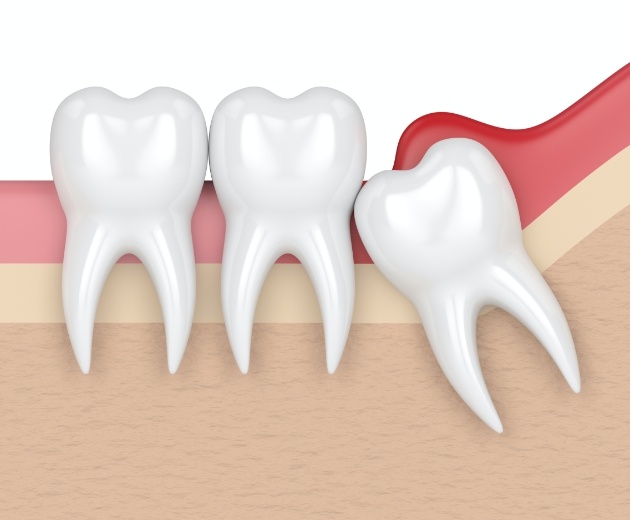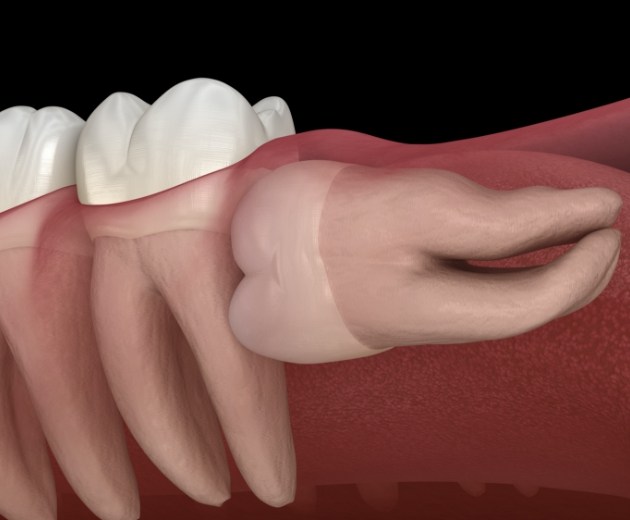Wisdom Tooth Extractions – Alexandria, VA
Removing Impacted,
Painful Wisdom Teeth
You don’t need your wisdom teeth to keep your smile functioning normally, so if they cause more harm than good in your mouth, they should be removed quickly. If you experience persistent pain near the back of your mouth or other symptoms that could point to wisdom tooth problems, our team at Northern Virginia Oral, Maxillofacial & Implant Surgery can remove the tooth in question to stop your pain and prevent further oral health issues through gentle wisdom tooth extractions in Alexandria, VA.
Why Choose Northern Virginia Oral, Maxillofacial & Implant Surgery for Wisdom Tooth Extractions?
-
Various Forms of
Sedation Available - State of the Art Techniques and Technology
- Board-Certified Oral Surgeons and Staff
Indications for Wisdom Tooth Removal

Some people can keep their wisdom teeth for their entire lives, while many others must have them removed. An extraction is typically required if:
- The wisdom teeth remain completely hidden underneath the gums, meaning they’re trapped (impacted) within the jaw.
- The wisdom teeth only emerge partially through the gums.
- The wisdom teeth start to crowd or damage the other teeth.
- The wisdom teeth are linked to infection, pain, cysts, tumors, and tooth decay.
Impacted
Wisdom Teeth

The wisdom teeth typically erupt during the late teens or early 20s, which is long after all the other teeth have erupted. Without enough space to emerge, the wisdom teeth often become trapped underneath the gums, which is not only painful, but tends to increase the risk of infection. Impacted wisdom teeth can be removed as soon as it’s determined that they are likely to cause problems in the mouth.
What to Expect After a Wisdom Tooth Extraction

Recovery takes about three to four days on average, although it could be as long as a week in some cases. You should be able to return to your normal routine the day after surgery, but you should still avoid strenuous exercise, smoking, spitting, and drinking from a straw; these activities could dislodge the stitches or blood clot protecting your wound. Plan on eating soft foods at first and working your way up to more solid meals. Call us immediately if pain, swelling, or bleeding grows worse.
Understanding the Cost of Wisdom Tooth Extractions

Do you have an upcoming wisdom tooth extraction? You may wonder how much it’ll cost. Well, it's important to understand that the overall price can vary based on individual cases. During your consultation, our team will provide a personalized estimate so you know exactly what to expect. Rest assured – we are committed to helping you afford the procedure by offering multiple financial assistance options. While the initial cost may seem daunting, it's important to recognize that wisdom tooth removal is a wise investment in your oral health.
Factors That Can Impact the Cost of Wisdom Tooth Extractions

The cost of wisdom tooth extractions can vary based on many factors, which are often discussed during the initial consultation. Some of these include:
- Number of teeth to be removed: While we typically remove all four wisdom teeth simultaneously, not all patients have them. Some choose to have only one or two extracted at a time, which can affect the overall cost.
- Impaction level: Impacted wisdom teeth, which are stuck beneath the gumline, can present challenges during extraction. The degree of impaction, whether partially erupted or fully embedded in the jawbone, can influence the price.
- Type and amount of sedation: Many patients prefer sedation during the procedure for a comfortable experience. The type and quantity of sedation given can impact the total cost.
- Performing surgeon: Our team can handle most wisdom tooth extractions. However, if we need to refer you to an outside specialist, the cost may be higher.
Does Dental Insurance Cover Wisdom Tooth Extractions?

While not all insurance plans offer coverage for dental surgeries, most offer partial coverage for wisdom tooth extractions. Of course, the extent of coverage depends on factors such as meeting your deductible or annual maximum. To better understand your specific benefits, you should contact your insurance provider directly. It’s worth noting that opting for an in-network provider can further reduce out-of-pocket expenses.
Other Options for Making Wisdom Tooth Extractions Affordable

Don’t worry – Northern Virginia Oral, Maxillofacial & Implant Surgery offers additional financing options to help make your wisdom tooth extraction as affordable as possible. You can take advantage of the following solutions:
- CareCredit Financing: With this option, you can split up the total cost of your care into smaller monthly installments. Each plan often comes with little-to-no interest, helping you stay within your budget. If you would like to sign up, don’t hesitate to get in touch!
- Special Offers: Currently, you can take advantage of 0% monthly financing wisdom teeth extraction special . You can get a payment plan as low as $199 per month!
Wisdom Teeth Q & A

You probably already know that wisdom tooth extraction is a fairly common procedure, but how much do you really know about the wisdom teeth themselves and the process for removing them? We answer some frequently asked wisdom teeth questions below; reach out if you want to know more.
What are wisdom teeth?
Wisdom teeth are your third set of molars and are typically the last teeth to erupt in your smile. They’re called wisdom teeth because they usually come in between the ages of 17 and 25 when you’re expected to have attained wisdom.
For modern humans, wisdom teeth don’t serve much of a purpose. They were more necessary for early humans when their diets were quite a bit rougher. Some people can keep their wisdom teeth, but most people don’t have enough room in their mouths, causing them to become stuck under the gumline. There are three different types of impactions:
- Soft Tissue Impaction - Your wisdom tooth erupts through your jawbone but doesn’t fully penetrate your gum, leaving the crown of your wisdom tooth either fully covered or only partially exposed.
- Partial Bony Impaction - Your wisdom tooth has partially erupted through your jawbone, but some or most of it is still stuck beneath the bone.
- Complete Bony Impaction - Your wisdom tooth is entirely submerged beneath your jawbone.
Do I need my wisdom teeth extracted?
Some of the more common dental problems associated with wisdom teeth include:
- Crowding - Your smile might not have enough room for an extra set of molars, which can put pressure on your other teeth and lead to their misalignment.
- Damage to Nearby Teeth - The teeth directly next to your wisdom teeth (your second molars) can frequently be affected by the emergence of impaction of your wisdom teeth, leading to periodontal disease, tooth decay, and possible bone loss.
- Infection - If your wisdom teeth are partially impacted, they’re highly susceptible to trapping food and bacteria in your gum tissue, which can lead to a dangerous and painful infection.
- Disease - Cysts and tumors can occasionally form in the areas of your smile around impacted wisdom teeth, though this is a less common concern.
What’s involved in wisdom tooth removal?
The team at Northern Virginia Oral, Maxillofacial & Implant Surgery first examines your smile to determine whether your wisdom teeth are posing enough of a threat to your health to necessitate extraction. They visually examine your smile and take panoramic or digital X-rays to aid in their evaluation.
If extraction is the best course of action, your oral surgeon removes your wisdom teeth in a relatively straightforward outpatient procedure. The procedure typically takes place under local anesthesia, intravenous (IV) sedation, or general anesthesia. You can expect a full recovery within one week.
Begin your wisdom tooth assessment today by scheduling an appointment with the team of experts at Northern Virginia Oral, Maxillofacial & Implant Surgery. You can book your visit by phone or online.
How Do You Make Wisdom Teeth Pain Go Away?
The only way to stop your wisdom teeth pain for good is to remove them. That said, there are a few ways you can enjoy temporary relief at home, such as
- Applying an ice pack wrapped in a towel to the outside of your cheek for 20-minute intervals.
- Taking over-the-counter medications like ibuprofen according to the directions on the label. (If you take aspirin, do not let it directly touch the hurting area.)
- Using oral numbing gel with benzocaine as the active ingredient to soothe the gums around the wisdom teeth.
- Rinsing with a saltwater solution to reduce swelling and minimize bacterial buildup.
We can give you additional suggestions for finding relief when you visit our office for a consultation.
Should Wisdom Teeth Be Removed Before Braces?
If you’re planning on getting braces soon, we’ll typically recommend having your wisdom teeth extracted before then. Wisdom teeth might push on your other teeth when they try to erupt, and that can end up undoing the effects of your orthodontic treatment. It’s best to wait to get braces until your wisdom teeth are gone so that the results will be more permanent.
If you already wore braces as a child, then it’s essential to have your wisdom teeth removed as soon as possible before they have a chance to damage the teeth. If you’re around the age when wisdom teeth are due to come in, it’s best to have an examination performed as soon as possible so that potentially problematic third molars can be identified before they can cause lasting harm.
How Long Does Wisdom Tooth Surgery Take?
A single wisdom tooth takes about 15 to 20 minutes to extract. If you’re having all four removed, the process may take up to 90 minutes, though the exact length of time depends on factors like the position of the tooth and whether it’s impacted. However, it won’t feel like any time has passed at all if the procedure is done while you’re being sedated, which is usually the case. Keep in mind that before the procedure begins, you will be given an estimate of how long it will take so that you can plan accordingly.
How Soon Can I Eat After Wisdom Tooth Removal?
It’s usually recommended that you wait for about an hour or two to eat after wisdom tooth removal. If you try chewing anything while your mouth is still numb, you might end up biting your lip, tongue, or cheek by accident; even if you don’t realize it at the time, it can result in serious discomfort once the anesthetic has worn off.
You should plan on eating only liquids for the first day after removal. For the next few days after that, plan on softer foods that don’t require much chewing. After about four to five days (or whenever you feel up to it) you can start gradually adding heartier foods back into your diet.
